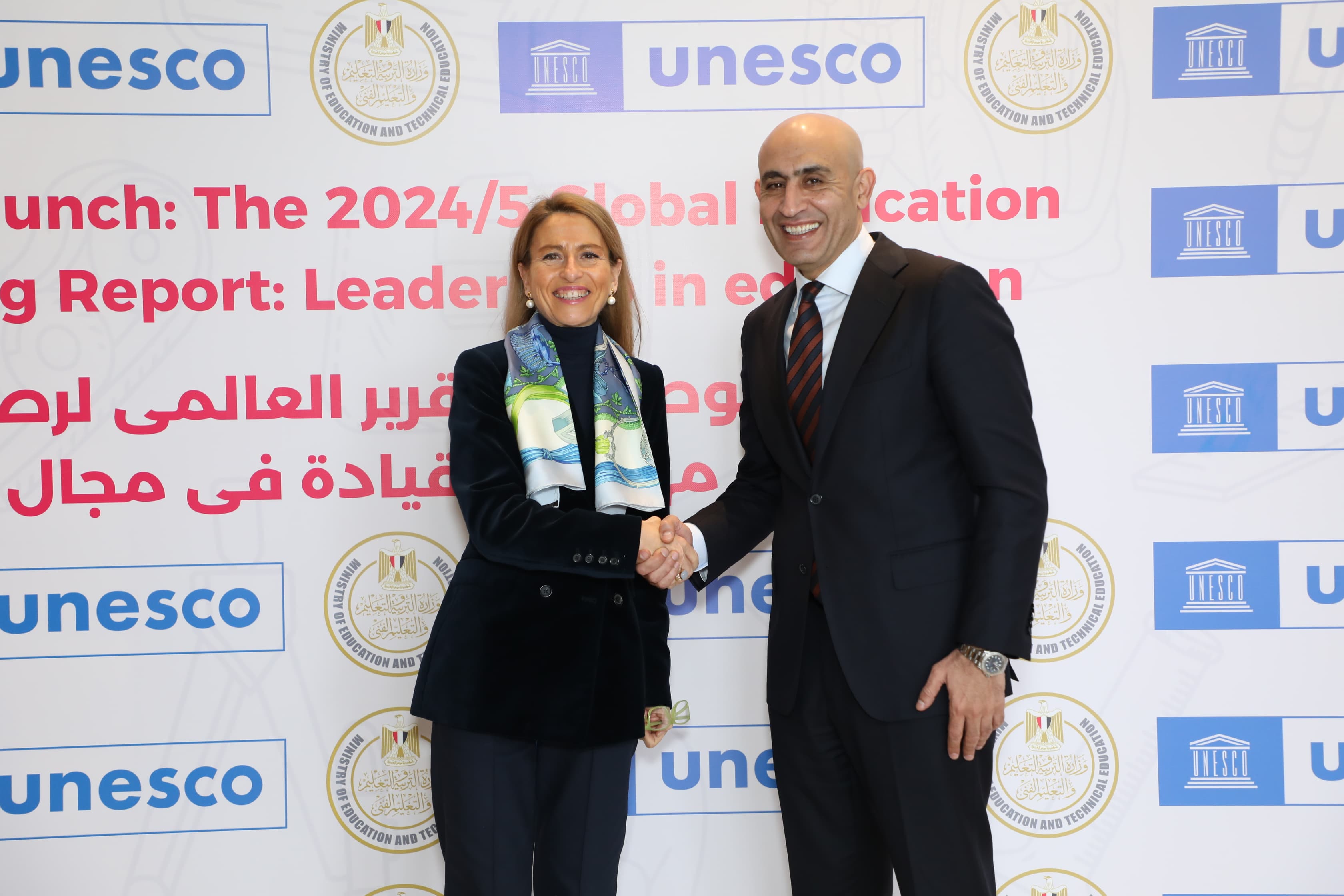The Minister of Education participates in UNESCO’s celebration of the International Day of Education

Mr. Mohamed Abdel Latif, Minister of Education and Technical Education, participated in UNESCO's celebration of the International Day of Education and the national launch of the Global Education Monitoring Report 2024-2025 (GEM) "Leadership in Education".
At the beginning of his speech, Minister Mohamed Abdel Latif expressed his happiness to participate in this important event, noting that this occasion confirms the commitment to education as a basic human right and a pillar of sustainable development.
Minister Mohamed Abdel Latif stressed that education is the foundation upon which nations build their future and ensure their prosperity, explaining that we in Egypt realize that the success of our education system directly affects our economic growth, social cohesion and global competitiveness, and under the leadership of His Excellency President Abdel Fattah El-Sisi, President of the Republic, we have embarked on a bold transformation of our national education system, a transformation that prioritizes equality, innovation and excellence.
The Minister pointed out that this journey was not without challenges, as the reality of high-density classrooms, a shortage in the number of teachers, and old assessment methods were confronted, as we achieved great progress that reshapes our education system.
In this context, the Minister reviewed the measures that have been implemented on the ground, saying: “We have succeeded in reducing class sizes from (250) students per class to a maximum of (50) students per class; thus ensuring a more effective learning environment for students, as well as implementing the necessary measures to address the shortage in the number of teachers, and ensuring that schools have the necessary resources to provide quality education, in addition to restructuring the secondary school curricula in line with international models, which led to reducing the total number of subjects; to address the burden that secondary school students previously faced and ensure a more equitable and competitive academic framework.
The Minister continued that continuous assessment methods have been introduced, including formative assessments, project-based learning, and digital tools, providing a more comprehensive measure of student progress throughout the academic year.
Minister Mohamed Abdel Latif explained that the essence of the reform lies in the belief that leadership in education is extremely important, and that school principals are not just administrators; rather, they are agents of change for their important role in bringing about positive changes, noting that in recognition of this, thousands of school leaders have been involved in a national initiative to enhance the decision-making process Decision-making, management and educational leadership, and these efforts have already led to tangible improvements, as student attendance was maintained at no less than 85% in the first semester, in addition to a more inclusive, supportive and attractive learning environment for students.
Minister Mohamed Abdel Latif also valued the partnership with UNESCO, and the continued commitment of its regional leadership to education, which works to shape collaborative efforts in updating curricula, gender equality, digital learning, and building teachers’ capacities, stressing that through these joint efforts, we have succeeded in strengthening curriculum updating, gender equality initiatives, digital learning strategies, and teacher capacity building programs that provide teachers with the necessary tools to enhance student learning outcomes.
The Minister added that the launch of the Global Education Monitoring (GEM) Report this year is a timely reminder that leadership in education is a shared responsibility, as it is not the duty of governments or policymakers alone, but rather a shared mission that includes teachers, parents and local communities, calling for translating the ideas presented in this report into valuable work.
The Minister also pointed out that today is not just a celebration of what has been achieved, but rather a call to redouble efforts, calling for moving forward with a renewed sense of purpose, to ensure that education remains the key to unleashing potential, enhancing creativity, and shaping a better world for future generations.
At the end of his speech, the Minister expressed his sincere appreciation to UNESCO for its solid partnership, and to all those who contributed to this vital dialogue, stressing the importance of working together to build an education system that is not only strong and comprehensive, but also provides individuals with the knowledge, skills, and resilience to shape the future.
For her part, Dr. Nuria Sanz, Director of the UNESCO Regional Office in Egypt, expressed her great appreciation for the progress made by Egypt in the field of education, praising the fruitful cooperation between UNESCO and the Ministry of Education under the leadership of Minister Mohamed Abdel Latif.
She stressed that Egypt has solid expertise in developing education systems, whether at the leadership or governance levels, making it a model to be emulated in the region.
In light of the Global Education Monitoring Report, Dr. Nuria Sanz praised the progress made by some Arab countries, including Egypt, in achieving the Sustainable Development Goals, but stressed that the region still needs additional efforts to narrow the gap with the rest of the world, noting that armed conflicts and humanitarian crises pose a major challenge, as 30 million children and youth in the Middle East and North Africa region have been deprived of education as a result of these conditions.
She said that with regard to Egypt, the report indicated that it was distinguished by several major achievements, including teacher training and digital transformation, as most primary school teachers participated in intensive training programs. UNESCO also launched the "Open Schools for All" project to promote digital learning, especially in marginalized areas, global citizenship and sustainable development, reflecting Egypt's commitment to integrating these concepts into educational policies, higher education and social inclusion.
